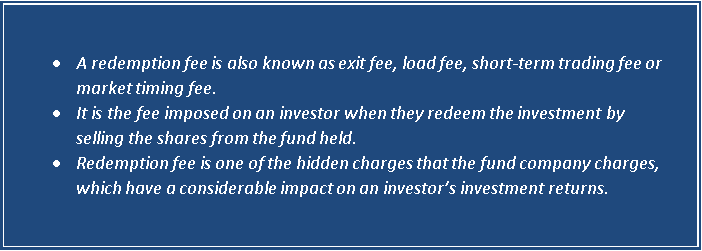What is a Redemption Fee?
A redemption fee, also known as exit fee, load fee, short-term trading fee or market timing fee, is a fee imposed on an investor when they redeem the investment by selling the shares from the fund held. The fee in levied as penalty to discourage short-term trading and encourage long-term trading. The redemption fee is levied by a Mutual Fund Company if the shares from the mutual fund are sold before a specific time frame. This fee is then added back to the fund where it can be invested in the fund’s portfolio to reimburse the other existing investors.
Redemption fee is one of the hidden charges that the fund company charges, which have a considerable impact on an investor’s investment returns. In case of annuity withdrawals, the redemption fees are known as surrender charges.

How does redemption fee work?
A redemption fee is often related to the charges imposed on investors when they sell shares from their mutual fund holdings. The fee is spread across the fund’s investor according to the amount they have invested in the fund, to promote fairness and equality.
When any investor invests in mutual fund the fund manager is charged with administrative cost for trading the securities to deliver returns to the investors. Further, the fund manager needs to keep record of all the trading within the fund to provide an electronic record or main a paper confirmation.
Although, even if few investors are selling their shares before the specified time frame, the fee is charged on investors to make frequent pay for the added costs they force the fund to incur.
How much is redemption fee?
The redemption fee depends on the fund an investor has invested in, but usually the fee amount to between 1% and 2% of the transaction amount as the Securities and Exchange Commission (SEC) do not allow redemption fee charges to be over 2% in most situations.
The specific time frame in which redemption fees is imposed also depends on the fund. It may be as little as 30 days, which means that investor may trade shares for 30 days without triggering the redemption fee. the another time frame can be 90 days, 180 days or even one year. Some funds also charges redemption fee even if the investors has hold the securities for several years.
Advantages of Redemption fees
The main motive behind imposing redemption fees on investor who sell their shares before the specified time frame is to discourage short-term trading and encourage long-term trading, as it increase the transaction costs.
These fees are imposed to protect the other existing investors from higher transaction costs. Short-term redemption creates two main issues for the fund manager. It includes:
- Increases the overall operating costs of the mutual fund
- The mutual fund needs to maintain higher cash position to accommodate sell orders.
The charges are imposed to keep the fund’s operating expenses and cash position lower. This is way a fee is charges to recoup the transaction expenses of the fund from the investors selling their shares before the specific time frame. Some of the other fees that the mutual fund firm charges are 12b-1 fees, sales loads, and account service fees.
How redemption fee is different from back-end sales loads
Back-end sales loads fees can be contingent deferred or static percentage fee that are paid to intermediaries and designed as part of a share class’s sales commission schedule. The fees are charged as the static percentage of asset transacted, in effect for the duration of a holding. It is generally lower than front-end fees, averaging around 1%. Whereas, the fee charged as contingent deferred decrease over the life of the investment and may even expire after a time frame. In such case a share class may be eligible for reclassification.
However, redemption fee is related to the mutual fund’s annual operating expenses and is imposed for selling shares in short-term.
 Please wait processing your request...
Please wait processing your request...